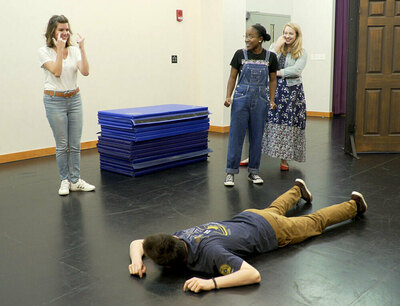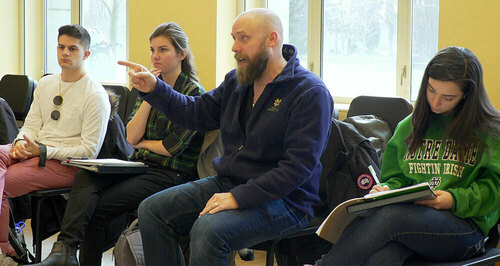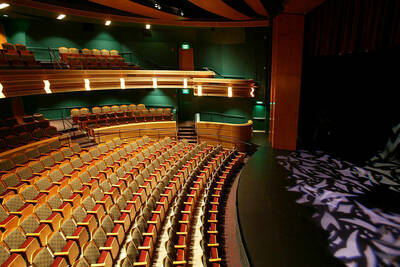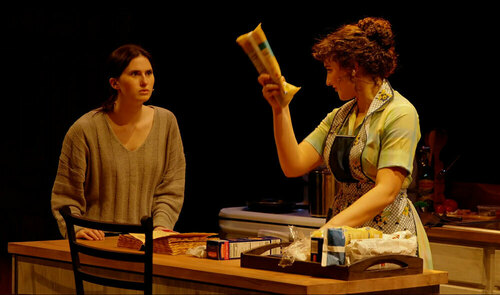
Macy Mateer comes from a family of performers.
Having spent her childhood auditioning and performing in shows along with her parents, she knew that no matter what she majored in at Notre Dame, she would find a way to be on stage.
When she learned about Notre Dame’s musical theatre minor, she was surprised to discover the breadth of roles involved in bringing a show to life. That’s when she fell in love with the behind-the-scenes job of dramaturg.
“They’re the bird’s-eye view of the show and responsible for keeping the show in focus,” said Mateer, a senior majoring in history in the College of Arts & Letters. “That’s a really cool role to have, and I didn’t realize how important that was in the process. I grew up thinking that the actor role was the only real role for musical theatre.”
Whether you are a performer, a creative person, or just a fan, Notre Dame’s musical theatre minor gives students the opportunity to perform, direct, compose, and create theatrical works in a collaborative, hands-on program.
“Our students are getting the real-world opportunities and the graduate-level, hands-on, on-the-job training that they would not get at most other undergraduate programs.”
Matt Hawkins, director of musical theatre, designed the program to focus on student leadership and follow in the liberal arts tradition.

“I’m interested in teaching students and building their diverse portfolio as artists,” he said. “Our students are getting the real-world opportunities and the graduate-level, hands-on, on-the-job training that they would not get at most other undergraduate programs.”
A partnership between the Department of Film, Television, and Theatre and the Department of Music, the interdisciplinary minor offers a range of classes that can center on a student’s interests, including musical theatre history, performance techniques, music composition, and voice lessons. The five-course minor concludes with a capstone project designed by the student. The program is not voice-centric and no performance ability is required for admission.
In addition to classes, Notre Dame offers numerous production opportunities throughout the year staged in a variety of venues, including the state-of-the-art DeBartolo Performing Arts Center.

“What a gift to be able to be in a theater like this,” said Hawkins, speaking from the Decio Mainstage Theatre at the DeBartolo Performing Arts Center. “It’s a real value and a real asset to have the venues here and to have multiple venues here, to allow us to do big proscenium shows and to do black-box theater shows — and all the student opportunities, too.”
While many undergraduates come to the minor wanting to pursue a career in theatre, most of the students have other career plans. The program will help them grow in a variety of ways, Hawkins said, including learning to take risks, developing an aggressive curiosity, and feeling more confident.
“A lot of these students, they loved theatre in high school, they know it’s not going to be a career, but they want to keep that a part of their life,” Hawkins said. “It’s going to build their capacity for understanding how art is made. Hopefully, they’re going to have a larger capacity for empathy for other people if they were in a show because they literally walk in someone else’s shoes.”
Political science major Sydney Kraft plans to go to law school after graduation, but minoring in musical theatre provided her with many important lessons.

“Musical theatre has taught me to be confident and to be brave,” she said. “Everything I’ve learned, I will use in the courtroom.”
While Kraft appreciates the skills she has gained from the minor, the ability to connect with audiences is just as rewarding, allowing people to see themselves portrayed on stage.
“Someone can be sitting in the audience and look up at a character and think, ‘I know exactly what they’re going through. I feel seen, I feel represented, and I’m not alone,’” she said. “It’s just awesome.”
Musical theatre, Hawkins said, is about more than putting on a show — it’s about holding a mirror up to society and sparking “very, very challenging” conversations among audiences.
“Theatre provides a communal experience where we get to look at a piece of art, and it allows people to have those conversations,” he said. “The brilliant thing about musical theatre is how a song can encapsulate so many intellectual and emotional ideas in one moment. That’s how you get people talking.”
“The brilliant thing about musical theatre is how a song can encapsulate so many intellectual and emotional ideas in one moment. That’s how you get people talking.”


